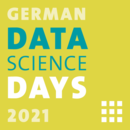German Data Science Days 2021
Mittwoch, 17. März 2021, 16:30 – online
Sie können sich hier registrieren. Nach der Registrierung erhalten sie eine Bestätigungs-E-Mail.
Wednesday, 17 March 2021, 16:30 – online
You can register here. You will receive a confirmation email after registration.
- Eyke Hüllermeier, Institute for Informatics, LMU Munich
Epistemic and Aleatoric Uncertainty in Machine Learning
Due to the steadily increasing relevance of machine learning for practical applications, many of which are coming with safety requirements, the notion of uncertainty has received increasing attention in machine learning research in the last couple of years. This talk will address the question of how to distinguish between two important types of uncertainty, often referred to as aleatoric and epistemic, in the setting of supervised learning, and how to quantify these uncertainties in terms of suitable numerical measures. Roughly speaking, while aleatoric uncertainty is due to inherent randomness, epistemic uncertainty is caused by a lack of knowledge. As a concrete approach for uncertainty quantification in machine learning, the use of ensemble learning methods will be discussed.
For more details, please refer to the following slides:
- Axel Helmert, Head of Product Management msg life central europe gmbh, Managing Director msg life Austria Ges.m.b.H.
Dr. Janek Thomas, Institute of Statistics, LMU Munich
ML-based transfer of knowledge in large-scale IT modernisation projects in the life insurance industry
Low interest rates, the shift in demographics and Covid-19 have brought old-age provision to the brink of a systemic crisis, as current studies by Europe’s leading policy institutions outline the overall situation. Moreover, millions of insurance policies run on outdated IT systems, which make them excessively cumbersome to manage. Hence, old contract data, together with the corresponding mathematical functions that define the behaviour of the contracts, need to be migrated, i.e. transferred from one or more source systems to a target system. By using trustworthy deep neural networks (DNNs) or other methods, calculating values like a premium, a present value or a reserve can be learned by a machine. The learned knowledge can be transferred and reactivated in a modern target system automatically.
For more details, please refer to the following slides:


